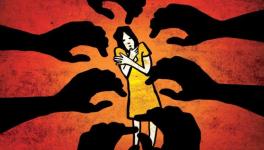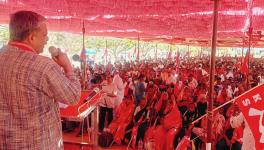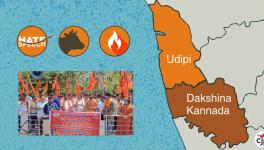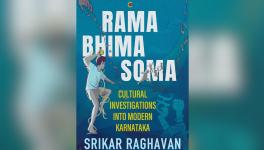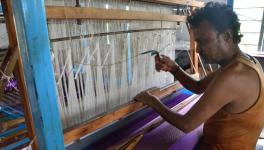Kannada Writer Banu Mushtaq’s ‘Heart Lamp’ Wins International Booker Prize
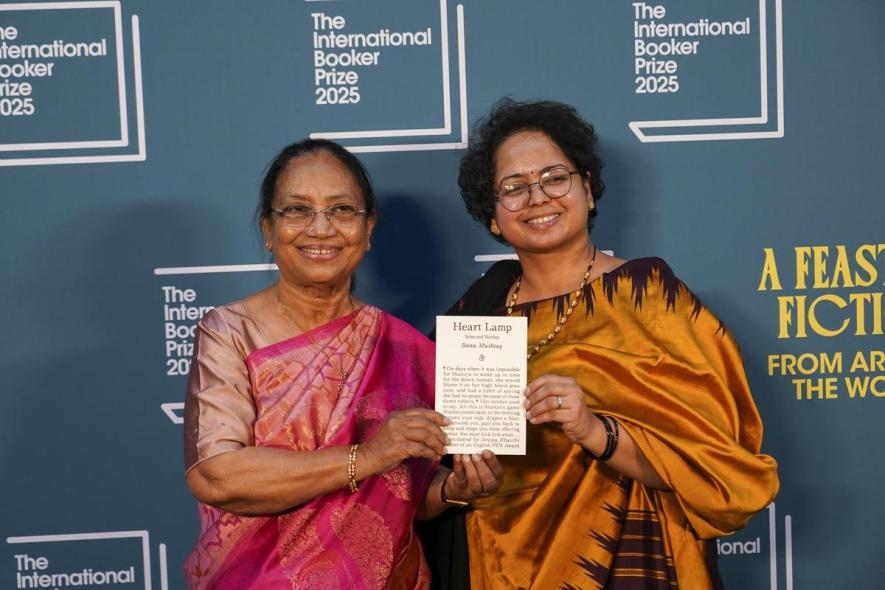
Banu Mushtaq and Deepa Bhasthi share the International Booker Prize 2025. Image credit: K J George X/@thekjgeorge
New Delhi: Banu Mushtaq, an Indian writer, lawyer, and activist, who writes in Kannada language, and her English translator, Deepa Bhasthi, won the International Booker Prize for Heart Lamp, a collection of short stories. The two women made history, as this is the first short story collection to have won the International Booker Prize, as well as the first for an Indian translator.
While announcing the prize of 50,000 pounds (to be shared by the two), the judges said the characters in Heart Lamp were “astonishing portraits of survival and resilience”.
The 12 poignant stories written between 1990 and 2023, as per a BBC report, depict the hardships and resilience of Muslim women in Southern India, mainly in Karnataka, from where Mushtaq hails.
Mushtaq, known for her advocacy of women’s rights and her fight against patriarchy, especially faced by Muslim women, in her acceptance speech said: "In a world that often tries to divide us, literature remains one of the last sacred spaces where we can live inside each other's minds, if only for a few pages," a BBC report said.
In 2002, Hindi writer Geetanjali Shree and her English translator Daisy Rockwell had won the award for the book, Tombs of Sand.
Various reports highlighted how Mushtaq's life experiences had influenced her literary work, especially the personal hardships faced by her in the conservative and deeply patriarchal Muslim community in Karnataka.
Born in 1954, she studied and grew up in a Muslim-dominated small town in Karnataka, learning mainly in Urdu language. He father, a government employee, later enrolled her in a convent school with Kannada as the language medium. She started creative writing in Kannada when she was in school.
BBC cited her interview with Vogue magazine where Mushtaq spoke about her early marital years marked by conflict. After a love marriage at the age of 26, she was told to wear a burqa and drown herself in domestic work. She also spoke of how she was forced to live a life confined within the four walls of her house, and went through post-partum depression at the age of 29. She told another magazine that once she even attempted to harm herself, but was saved by her husband.
Later, Mushtaq rebelled and worked as a reporter in a local tabloid and was also associated with the progressive Bandaya (rebellion in Kannada) literary movement in the 1970s and 1980s, which aimed to combat social and economic injustices through literature and activism.
A decade later, she left journalism and became a lawyer. She has had to face a lot of hate and threats.
However, Mushtaq never stopped writing. Some of her works have won prestigious local and national awards, including the Karnataka Sahitya Academy Award and the Daana Chintamani Attimabbe Award. In 2024, the translated English compilation of her five short story collections, Haseena and Other Stories, also won the PEN Translation Prize.
Her works include Hejje Moodida Haadi (1990), Benki Male (1999), Edeya Hanate (2004), Safeera (2006), Haseena Mattu Itara Kathegalu (2015) and Hennu Haddina Swayamvara (2022). Her story Black Cobra, included in Heart Lamp, was adapted into the award-winning film Hasina by Girish Kasaravalli, according to a report in The Hindu.
Mushtaq has been known for her consistent challenge to chauvinistic religious interpretations, and even faced a physical attack once. Her writings, however, continue to focus on the basic struggles of women and marginalised communities.
Get the latest reports & analysis with people's perspective on Protests, movements & deep analytical videos, discussions of the current affairs in your Telegram app. Subscribe to NewsClick's Telegram channel & get Real-Time updates on stories, as they get published on our website.










